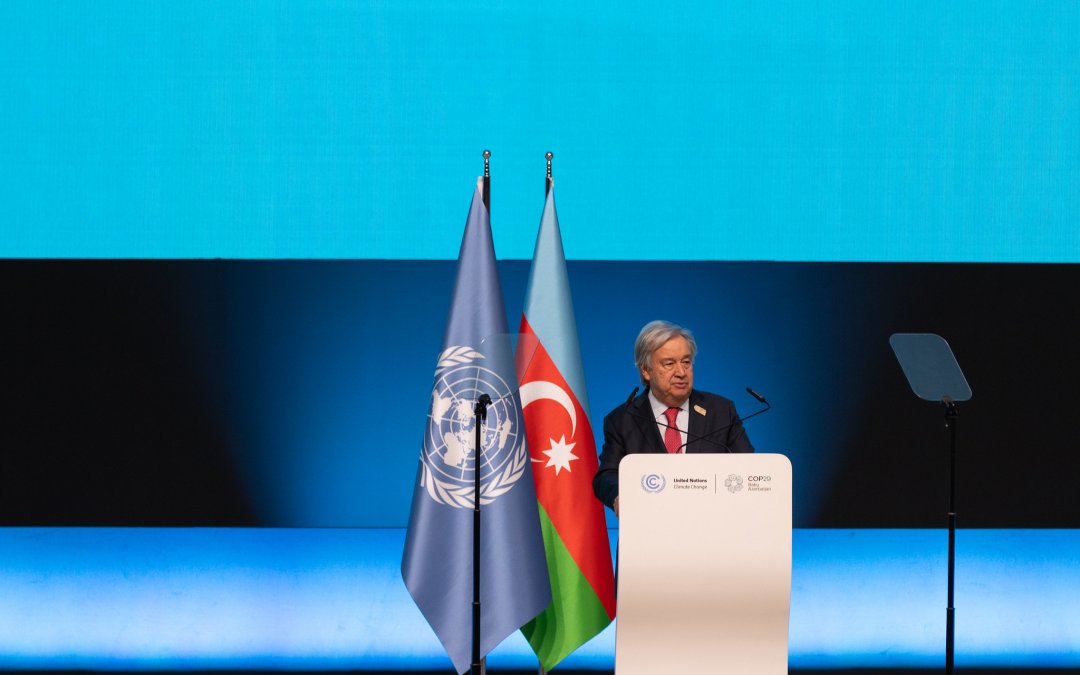WASHINGTON – World leaders discussed climate change solutions at the United Nations’ climate change conference in Azerbaijan this week, amid the increasing threat of global warming during the hottest year on record.
The conference, known as COP29, brought together roughly 70,000 people from 196 countries. Talks focused on investing in ways to combat climate change and meeting the goals of the Paris Agreement.
“The world must pay up, or humanity will pay the price,” U.N. Secretary-General António Guterres said to world leaders at the opening of the summit.
2024 is on track to be the hottest year on record nearly a decade after the Paris Agreement, where 196 countries pledged to limit global temperature rise to 1.5 degrees celsius. In order to reach this goal, emissions must peak before 2025 and decline 43% by 2030, according to the U.N. Framework Convention on Climate Change.
As global temperatures continue to rise, world leaders began to discuss plans to meet the lofty goals of the agreement at the conference.
The agenda
The World Leaders Climate Action Summit opened Tuesday morning with speeches from dozens of heads of state. Speakers emphasized commitment to a green future and called for increased action from G20 countries.
Climate finance took center stage at the conference, and U.N. speakers urged world leaders to pledge more money to the Fund for responding to Loss and Damage, which finances climate change mitigation and relief in developing countries.
Speakers also cited the potential toll of climate change on the global economy to incentivize state and business leaders to act.
“Worsening climate impacts will put inflation on steroids unless every country can take bolder climate action,” U.N. Climate Change executive secretary Simon Stiell said.
Stiell urged leaders not to make the same mistake they did during the pandemic in acting too slowly when supply chains were disrupted. He called on leaders to create a global climate finance goal at the conference.
Business leaders set the tone for climate finance at the conference with an announcement on Tuesday from a group of multilateral development banks that their collective climate financing would reach an estimated $170 billion by 2030.
Leaders from small island nations, some of the most significantly affected by climate change, urged G20 nations to contribute to international climate resilience efforts and relief funds.
“In this hour of crisis, it seems some would choose isolation over unity, self-interest over collective action,” said Bahamas Prime Minister Philip Davis. “But we, the nations most at risk, do not have the luxury to retreat.”
Davis implored his fellow world leaders to contribute to global climate finance and warned against inaction. But only some answered the call.
Major players
United Kingdom Prime Minister Keir Starmer made headlines with his announcement of new targets for emissions and climate change action. Starmer said the U.K. will aim for an 81% cut in emissions by 2035.
“There is no national security, there is no economic security, there is no global security, without climate security,” Starmer said at the conference.
Some major leaders were notably absent at the conference including U.S. President Joe Biden and Chinese President Xi Jinping, heads of the top two countries in greenhouse gas emissions. Other key powers like India, France and Germany also did not send their heads of state.
John Podesta, Biden’s senior advisor on international climate policy, led the U.S. delegation at the conference, during which the Environmental Protection Agency finalized a new policy to reduce methane emissions.
The policy requires oil and gas companies to pay a fee for excessive methane emissions, following the directive of the Inflation Reduction Act of 2022, which the Biden administration and environmental groups have called the most significant climate legislation in U.S. history.
Under the Biden administration, the U.S. has increased climate finance for developing countries from $1.5 to $9.5 billion from 2021 to 2023. Biden pledged to work with Congress to scale this number up to over $11 billion by 2024.
Donald Trump’s victory in the presidential election makes U.S. negotiations at the conference somewhat futile. The president-elect is expected to roll back many Biden-era environmental policies and regulations. Trump has promised to withdraw from the Paris Agreement as he did in his first term, reversing Biden’s act of rejoining it in 2021.
Despite the uncertain future for U.S. climate policies, Podesta reiterated the country’s ongoing commitment to fighting climate change at the conference.
“Science is still science,” Podesta said. “The fight is bigger than one election, one political cycle and one country.”
Azerbaijan in the limelight
The location of the climate conference has also garnered outrage from many activists due to Azerbaijan’s position as a major oil producer and the country’s recent conflicts with Armenia.
Azerbaijani President Ilham Aliyev acknowledged the irony of a climate change conference hosted in the city where the first industrial oil well was drilled. Aliyev called oil and gas a “gift of the God,” while also emphasizing the country’s commitment to a “green transition.”
Climate activists have accused Azerbaijan of “greenwashing,” attempting to appear more environmentally friendly than the country actually is.
Swedish activist Greta Thunberg gathered with fellow activists in Tbilisi, Georgia on Tuesday to protest Azerbaijan’s hosting of the conference, where she accused the country of being a “repressive, occupying state” in a video from the Associated Press, referring to its displacement of ethnic Armenians in September 2023.
Despite the underlying controversies, the conference opened as usual and will continue through Nov. 22 as countries evaluate the progress of old agreements and negotiate new solutions.

